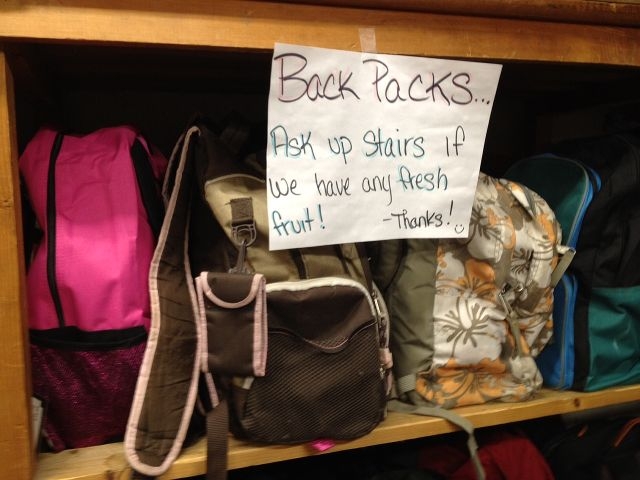
It’s estimated that one in five Vermont children is unsure, at some point during the week, where his or her next meal is coming from. That’s called "food insecurity."
Now that classes are back in session, a lot of those Vermont children are not as hungry as they may have been over the summer. That’s because they get free or discounted lunch in school.
But how well do they eat on the weekends? That depends on whether they can take home some extra groceries in their backpacks.
Every Tuesday afternoon, volunteers at the H.O.P.E store, a thrift shop in Lyndonville, fill donated backpacks with donated food. A few days later, Dave Hilfinger, a guidance counselor at the Lyndon Town school, picks them up.
"Open a backpack and inside-there’s a bag of Doritos, cut green beans, a couple boxes of macaroni and cheese, and then a couple boxes of milk" Hilfinger says, taking inventory of one brightly colored pack.
There’s also a loaf of bread, ramen noodles, and a box of cereal. Hilfinger knows that if it weren’t for these backpacks, some students would arrive at school on Monday morning too hungry to learn.
"Students who are hungry have behavioral and academic challenges. I’ve seen it many times where a student who is struggling may come to my room or to our refocus room and request something to eat. And after they eat they calm down and are in much better shape. But I know, in this area especially, we have about 70 percent of our students on free or reduced lunch,"he says.
That’s more than three hundred children. This year, at the Lyndon Town School, fourteen get the backpacks. The packs go directly to their bus drivers, who hand them over as discreetly as possible as students get off.
But at least one student, twelve-year-old Hunter Sharon, is proud to carry his. In the small, drafty farmhouse he shares with his parents and two siblings, his mother Raelynn says he loves unpacking and passing out the goodies. And for him, that’s a welcome change.
"He was hoarding food," his mother explains. "So this was a way of him seeing that, ‘Yes, he does have the box of spaghetti, or the granola bars, or the little things of milk or whatever.’ He knows, ‘I definitely have that.’ And he can definitely take that at any time and use it."
Sharon can’t easily shop right now because she recently fell and broke her leg. Disability isn’t new to her-fourteen years ago she broke multiple bones in a car accident, and that led for a while to depression. Her husband has diabetes and an unsteady flow of work. So it’s not unusual, she says, to walk into the local supermarket without enough money to buy what her kids need to eat.
"I haven’t been able to work for two years so they know things are tough and I can’t always just go buy whatever they want. I’ve always told them not to be embarrassed if they need something," she says.
But the family also gives back. This week Sharon will donate the same jar of peanut butter that showed up in the backpack to begin with, because she can spare it. This food program is run independently by the nonprofit H.O.P.E organization and three local schools, who get a total of fifty backpacks. St. Johnsbury and fifteen other schools get similar portable meals from the Vermont Food Bank. But the Food Bank says the roster of schools it serves is now set for the year, and it cannot add any more to it.